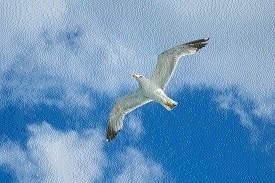Of inner flow
Date :03-Aug-2021

By Vijay Phanshikar :
“Flow is being completely involved in an activity for its own sake. The ego falls away. Time flies. Every action, movement and thought follows inevitably from the previous one, like playing jazz. ...”
- Mihalay Csikszentmihaly,
celebrated psychologist
for his path-breaking work
on deciphering human creativity.
Prose
Of inner flow SIMPLE words -- one may say. Yet, what psychologist Mihalay Csikszentmihaly talks of smashes down almost all the frills of intelligence we so often wear. Only tentatively do we realise from what source human creativity emerges. Only superficially we pay tributes to excellence in performance -- in any field -- without actually understanding the dynamics of human inputs. A deeper thought, however, leads to the very same finding that Mihalay Csikszentmihaly reached through terrific research into the process of human urge to excel. And to all that activity -- inner and outer, invisible and visible -- he calls ‘flow’. In other words, Mihalay Csikszentmihaly (a name difficult to pronounce!) simplifies the process of how human excellence comes about.
When a person is fully absorbed in an activity, when he -- or she -- is totally lost in its folds, when he loses awareness of the surroundings, when he loses track of time, when he even sheds his sense of self-consciousness, he arrives at that sensory point of flow. What emerges is an expression of excellence -- achieved through the funnelling of one’s all faculties, physical and metaphysical, into one point of confluence of inner and outer horizons. The ego -- that is awareness of one’s own identity -- has fallen away. Nothing else matters. One activity flows into another into another into another ...! -- like playing jazz, when each note emerges from the previous one, in an unbroken flow and goes on until culmination. Mihalay Csikszentmihaly separates such a state from any external purpose -- being completely involved in an activity for its own sake.
Richard Bach describes this process more or similarly in his seminal novella ‘Jonathan Livingston Seagull’, in effect, that the protagonist flies for flying, in search of bliss of taking to wings, to let the fresh air blow into his face, to let the fragrance of the skies fill his lungs -- unlike other seagulls that fly for food. Food, for Jonathan Livingston Seagull, is too small a goal as a destination for flying. Flying for flying is what he wants to do -- all the time. That pursuit takes him not just to higher grades of flying, but also to what Bach talks of as ‘higher regions’. That is the description of ‘flow’ in Bach’s words. Every thinker who expends his spiritual energies to understand why humans go beyond mere existential stimulus and get involved in some activity for its own sake, has found that expression of excellence does not have purpose other than excellence. Food. Shelter.
Fame. Funds. Safety. ... Nothing of these matters. What matters is achieving the culmination of that activity by creating an uninterrupted flow of inner impetus -- without any external trappings. In that state, flow is the most natural outcome of the core human urge to express -- metaphysical in content and physical in form. That state has its own accompanying music of sublime emotion -- like wonderfully flowing notes of jazz!